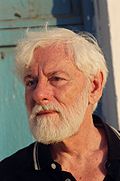Nordau, a famous German-Jewish intellectual, did not dream of accepting this offer. He must have considered it crazy. The Turks were the masters of the country. They could give Palestine to the Jews. They could be bribed. The Arabs were powerless. They could give us nothing.
So the moment passed. Nordau mentioned the idea to the Zionist Congress in Hamburg, but nobody took any notice.
Few people know about this episode. It is described in the authoritative book by the late Aharon ("Aharonchik") Cohen.
The possibility existed only in theory. History is made by real people, whose consciousness is formed by the realities of their time. For Europeans of the early 20th century, the idea of such an alliance with the natives against an imperial power was close to lunatic.
IN RETROSPECT, this idea could have changed history. We would have been born into a different world.
In the autumn of 1947, when I was just 24 years old, I published a booklet called (in Hebrew) "War or Peace in the Semitic Region."
It was an almost exact repetition of the ideas in the Nordau incident -- which I knew nothing about at the time.
It opened with the words:
"When our fathers, the Zionists, decided to set up a 'safe haven' in this country, they had the choice between two paths:
"They could appear in West Asia as a European conqueror, who sees himself as the bridgehead of the 'white' race, a master of the 'natives,' like the Spanish conquistadores and the Anglo-Saxon colonists in America. This is what the Crusaders at their time did in this country.
"The other path was to see themselves as an Asiatic people returning to its homeland -- who sees himself as an heir of the political and cultural tradition of the Semitic race, and is ready to lead the people of the Semitic Region in the war of liberation against European exploitation."
With the exception of the terminology, which belonged to its time, I subscribe to every word even today, almost 70 years later.
The Israeli-Palestinian conflict began when the first Jewish colonist came to this country in 1882, even before the official founding of the Zionist movement. It began as a clash between two great national movements which were totally ignorant of each other. This ignorance persists, in large part, to this very day.
The past cannot be changed.
But perhaps, perhaps, we can learn from it and draw some conclusions.
(Note: You can view every article as one long page if you sign up as an Advocate Member, or higher).





